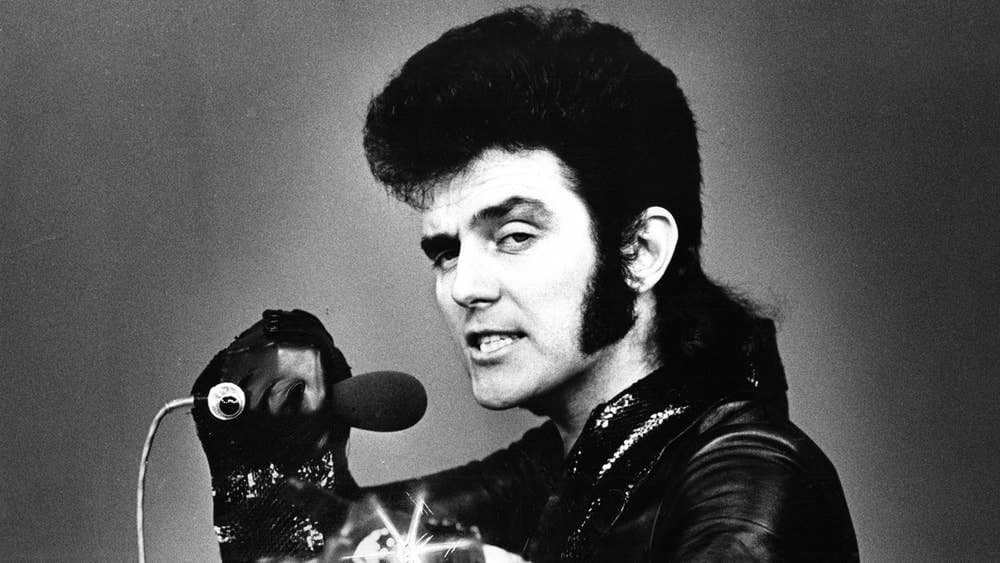
“Jealous Mind”: The Glam Rock Anthem of Suspicion and Obsession
Step into a time machine, if you will, and set the dial for the early 1970s. The air crackled with a new kind of energy – the flamboyant, theatrical spectacle of glam rock. And at the heart of this dazzling movement stood Alvin Stardust, a figure shrouded in black leather, sideburns prominent, and a voice that delivered rock ‘n’ roll with an undeniable, menacing swagger. Among his most iconic contributions to this glittering era is the unforgettable “Jealous Mind,” a song that perfectly captured the dark undertones beneath the genre’s shimmering surface.
Released in 1973 as a single, “Jealous Mind” wasn’t just a hit; it was Alvin Stardust’s magnum opus, his only chart-topper in the UK. It rocketed to number one on the UK Singles Chart in March 1974, spending a triumphant week at the pinnacle. This phenomenal success solidified his place as a true glam rock icon, following closely on the heels of his breakthrough hit, “My Coo Ca Choo.” The song was a staple on radio waves and Top of the Pops, its distinctive sound and persona becoming instantly recognizable to millions. It also appeared on his debut album, “The Untouchable,” released in 1973. For those of us who lived through the vibrant, sometimes outlandish, tapestry of 70s pop, “Jealous Mind” remains a vivid, thrilling reminder of a time when music was as much about image and attitude as it was about melody.
The story of Alvin Stardust is, in itself, a fascinating tale of reinvention. The man behind the leather suit was Bernard William Jewry, who had found modest success in the early 1960s as Shane Fenton. After a decade out of the spotlight, he was presented with the opportunity to embody the newly created glam rock persona of Alvin Stardust. The character, with his enigmatic stare and dramatic stage presence, was initially conceived by Peter Shelley, who not only wrote and produced “My Coo Ca Choo” but also performed as the original “Alvin Stardust” on a TV show before Jewry took over the role. It was Peter Shelley who also penned and produced the brooding masterpiece that is “Jealous Mind.” This creative partnership was instrumental in crafting Stardust’s distinctive sound and image, ensuring a consistent and compelling artistic vision.
Lyrically, “Jealous Mind” dives headfirst into the unsettling depths of obsession and possessiveness. It’s a raw, unflinching portrayal of a lover consumed by doubt and suspicion, convinced that their partner’s affections are wavering, or worse, have already strayed. The repeated refrain, “I’ve got a jealous mind,” isn’t merely a statement; it’s a confession, a warning, and a lament all rolled into one. The song’s power lies in its ability to tap into a universal, albeit uncomfortable, human emotion. It speaks to the gnawing insecurity that can plague even the strongest relationships, the fear of betrayal, and the desperate need for reassurance. For older listeners, the song might evoke memories of youthful anxieties, the intense highs and crushing lows of burgeoning romance, or perhaps even the darker, more unsettling aspects of possessive love. It’s a stark reminder that beneath the glittering façade of glam, there were real, raw emotions at play.
Musically, “Jealous Mind” is a quintessential glam rock track. Its driving, insistent rhythm, combined with Stardust’s deep, almost growling vocals, creates an atmosphere of edgy tension. The guitars are sharp and prominent, building a sonic wall that perfectly complements the song’s themes of confinement and anxiety. It’s a track that grabs you from the first beat and doesn’t let go, pulling you into its dramatic narrative. For many, it’s more than just a song; it’s a visceral experience, a throwback to a time when pop music dared to be a little dangerous, a little theatrical, and utterly captivating. “Jealous Mind” stands as a testament to Alvin Stardust’s unique ability to embody a character and deliver a performance that resonated deeply, leaving an indelible mark on the annals of British pop and glam rock history.